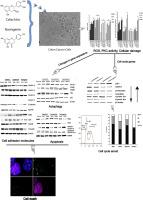当前位置:
X-MOL 学术
›
Process Biochem.
›
论文详情
Our official English website, www.x-mol.net, welcomes your
feedback! (Note: you will need to create a separate account there.)
Flavonoids regulate cell death-related cellular signaling via ROS in human colon cancer cells
Process Biochemistry ( IF 3.7 ) Pub Date : 2021-02-01 , DOI: 10.1016/j.procbio.2020.10.002 Muzaffer Dükel , Zehra Tavsan , Hulya Ayar Kayali
Process Biochemistry ( IF 3.7 ) Pub Date : 2021-02-01 , DOI: 10.1016/j.procbio.2020.10.002 Muzaffer Dükel , Zehra Tavsan , Hulya Ayar Kayali

|
Abstract Although several studies investigated effects of flavonoids on proliferation and apoptosis, yet no study has correlated the cellular damage caused by reactive oxygen species (ROS) production, cell death related pathways and cell adhesion molecules (CAM) expression with cell survival. Here, we investigate cytotoxic effect of catechin, epicatechin and naringenin on colon cancer cells. While especially naringenin demonstrated most significant inhibition of colon cancer cell viability, high concentrations treatment did not exhibit more pronounced effect in colon epithelial cells. In addition, these flavonoids caused excessive ROS generation resulting in the impairment of lipid and protein, followed by the induction of apoptosis and autophagy. In details, mechanism studies revealed that elevated ROS production leads to caspase activation and pretreated NAC, an antioxidant, blocks catechins and naringenin induced apoptosis and autophagy. PKC activity assay data also showed that catechin and naringenin treatment decreases PKC activity that leads to cell death. Moreover, studied flavonoids, especially naringenin, induced G2/M cell cycle arrest in a ROS-independent manner. Furthermore, the studied flavonoids suppressed or decreased the expression of the cancer progression and metastasis-related cell adhesion molecules. Taken together, our results indicate that studied flavonoids suppress colon cancer cell growth via inducing cell death in ROS dependent manner.
中文翻译:

黄酮类化合物通过人结肠癌细胞中的 ROS 调节细胞死亡相关的细胞信号
摘要 虽然有几项研究调查了黄酮类化合物对增殖和凋亡的影响,但没有研究将活性氧 (ROS) 产生、细胞死亡相关通路和细胞粘附分子 (CAM) 表达引起的细胞损伤与细胞存活相关联。在这里,我们研究了儿茶素、表儿茶素和柚皮素对结肠癌细胞的细胞毒作用。虽然柚皮素尤其表现出对结肠癌细胞活力的最显着抑制,但高浓度处理在结肠上皮细胞中并未表现出更显着的效果。此外,这些黄酮类化合物会导致过量的 ROS 产生,导致脂质和蛋白质受损,进而诱导细胞凋亡和自噬。详细来说,机制研究表明,增加的 ROS 产生导致 caspase 激活,预处理 NAC(一种抗氧化剂)可阻断儿茶素和柚皮素诱导的细胞凋亡和自噬。PKC 活性测定数据还表明,儿茶素和柚皮素处理会降低导致细胞死亡的 PKC 活性。此外,研究的黄酮类化合物,尤其是柚皮素,以不依赖 ROS 的方式诱导 G2/M 细胞周期停滞。此外,研究的黄酮类化合物抑制或降低了癌症进展和转移相关细胞粘附分子的表达。总之,我们的结果表明所研究的类黄酮通过以 ROS 依赖性方式诱导细胞死亡来抑制结肠癌细胞生长。PKC 活性测定数据还表明,儿茶素和柚皮素处理会降低导致细胞死亡的 PKC 活性。此外,研究的黄酮类化合物,尤其是柚皮素,以不依赖 ROS 的方式诱导 G2/M 细胞周期停滞。此外,研究的黄酮类化合物抑制或降低了癌症进展和转移相关细胞粘附分子的表达。总之,我们的结果表明所研究的类黄酮通过以 ROS 依赖性方式诱导细胞死亡来抑制结肠癌细胞生长。PKC 活性测定数据还表明,儿茶素和柚皮素处理会降低导致细胞死亡的 PKC 活性。此外,研究的黄酮类化合物,尤其是柚皮素,以不依赖 ROS 的方式诱导 G2/M 细胞周期停滞。此外,研究的黄酮类化合物抑制或降低了癌症进展和转移相关细胞粘附分子的表达。总之,我们的结果表明所研究的类黄酮通过以 ROS 依赖性方式诱导细胞死亡来抑制结肠癌细胞生长。研究的黄酮类化合物抑制或降低了癌症进展和转移相关细胞粘附分子的表达。总之,我们的结果表明所研究的类黄酮通过以 ROS 依赖性方式诱导细胞死亡来抑制结肠癌细胞生长。研究的黄酮类化合物抑制或降低了癌症进展和转移相关细胞粘附分子的表达。总之,我们的结果表明所研究的类黄酮通过以 ROS 依赖性方式诱导细胞死亡来抑制结肠癌细胞生长。
更新日期:2021-02-01
中文翻译:

黄酮类化合物通过人结肠癌细胞中的 ROS 调节细胞死亡相关的细胞信号
摘要 虽然有几项研究调查了黄酮类化合物对增殖和凋亡的影响,但没有研究将活性氧 (ROS) 产生、细胞死亡相关通路和细胞粘附分子 (CAM) 表达引起的细胞损伤与细胞存活相关联。在这里,我们研究了儿茶素、表儿茶素和柚皮素对结肠癌细胞的细胞毒作用。虽然柚皮素尤其表现出对结肠癌细胞活力的最显着抑制,但高浓度处理在结肠上皮细胞中并未表现出更显着的效果。此外,这些黄酮类化合物会导致过量的 ROS 产生,导致脂质和蛋白质受损,进而诱导细胞凋亡和自噬。详细来说,机制研究表明,增加的 ROS 产生导致 caspase 激活,预处理 NAC(一种抗氧化剂)可阻断儿茶素和柚皮素诱导的细胞凋亡和自噬。PKC 活性测定数据还表明,儿茶素和柚皮素处理会降低导致细胞死亡的 PKC 活性。此外,研究的黄酮类化合物,尤其是柚皮素,以不依赖 ROS 的方式诱导 G2/M 细胞周期停滞。此外,研究的黄酮类化合物抑制或降低了癌症进展和转移相关细胞粘附分子的表达。总之,我们的结果表明所研究的类黄酮通过以 ROS 依赖性方式诱导细胞死亡来抑制结肠癌细胞生长。PKC 活性测定数据还表明,儿茶素和柚皮素处理会降低导致细胞死亡的 PKC 活性。此外,研究的黄酮类化合物,尤其是柚皮素,以不依赖 ROS 的方式诱导 G2/M 细胞周期停滞。此外,研究的黄酮类化合物抑制或降低了癌症进展和转移相关细胞粘附分子的表达。总之,我们的结果表明所研究的类黄酮通过以 ROS 依赖性方式诱导细胞死亡来抑制结肠癌细胞生长。PKC 活性测定数据还表明,儿茶素和柚皮素处理会降低导致细胞死亡的 PKC 活性。此外,研究的黄酮类化合物,尤其是柚皮素,以不依赖 ROS 的方式诱导 G2/M 细胞周期停滞。此外,研究的黄酮类化合物抑制或降低了癌症进展和转移相关细胞粘附分子的表达。总之,我们的结果表明所研究的类黄酮通过以 ROS 依赖性方式诱导细胞死亡来抑制结肠癌细胞生长。研究的黄酮类化合物抑制或降低了癌症进展和转移相关细胞粘附分子的表达。总之,我们的结果表明所研究的类黄酮通过以 ROS 依赖性方式诱导细胞死亡来抑制结肠癌细胞生长。研究的黄酮类化合物抑制或降低了癌症进展和转移相关细胞粘附分子的表达。总之,我们的结果表明所研究的类黄酮通过以 ROS 依赖性方式诱导细胞死亡来抑制结肠癌细胞生长。











































 京公网安备 11010802027423号
京公网安备 11010802027423号